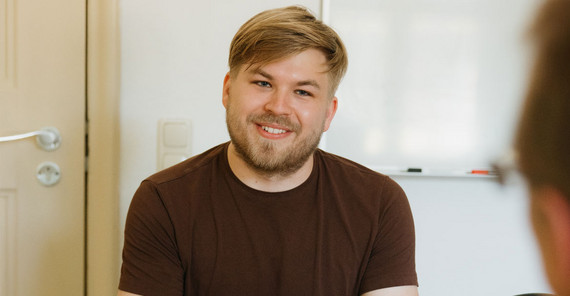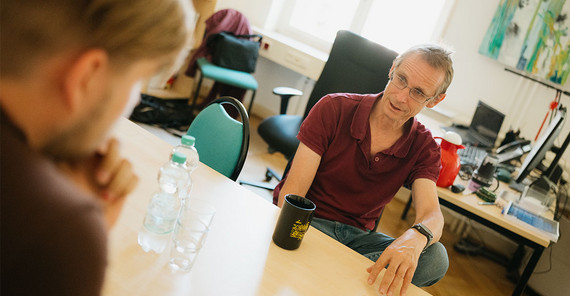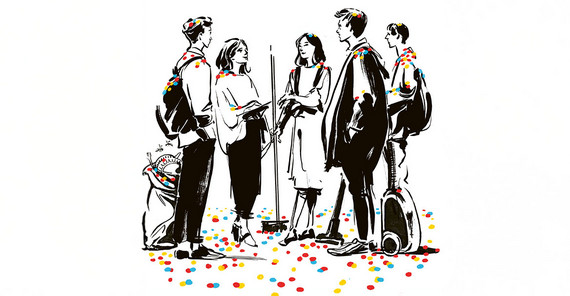Prof. Kohler, what was the goal of the survey?
Ulrich Kohler: In the Higher Education Framework Act, the legislator requires that universities not only take care of students’ skills and professional education but also of their socialization as democratic personalities. This is considered one of several dimensions of academic success. We wanted to find out: Does it work?
Did you expect that students would become politically aware?
Kohler: I must admit, I personally didn’t expect this. Students are only at university for a relatively short time compared with the time they spent at home and with their peers at school. In addition, the early period of growing up has a stronger impact.
Is there an opposite position?
Kohler: There are two arguments in favor of politicization happening en passant at university. In the non-hierarchical discourses in the university environment, students gain the competence to participate confidently and successfully in the democratic process. In addition, the knowledge acquired at university teaches them to argue more effectively.
Mr. Beier, you actively took part in many committees – how politically active do students become?
Sönke Beier: I also took part in Prof. Kohler’s survey. In my opinion, politicization can only be achieved to a certain extent in the context of teaching, for example through open discussions in lectures and seminars. It would be interesting to ask how academic and student self-administration can contribute more to students wanting to participate democratically and establish their own ideas.
Prof. Kohler, was this aspect part of your survey?
Kohler: We based our study on a broad understanding of participation and therefore surveyed three dimensions: attitudes and values, knowledge, and concrete behavior, i.e., participation in academic committees as well as in citizens’ initiatives or sports clubs outside the university. We wanted to know whether values and knowledge change during the course of study in such a way that they lead to certain behaviors.
What is the outcome of the study?
Kohler: By comparison, our students are more participatory than the population on average. However, when we look at how this has developed over time – from one year to the next, comparing bachelor’s to master’s degrees, short and long periods of study – we find no differences. When it comes to the question of whether students at the University of Potsdam are becoming even more democratically politicized, the answer is no. Other findings also give no reason to believe that this would be different at other universities.
Mr. Beier, what prompted you to get involved at university?
Beier: It started with an ordinary question from a physics student: I want to work on the weekends, but the university is closed. How do I get in there? Couldn’t all students open the building with their university chip card? At that time, it was not possible to implement this idea, but it brought me to the student council. And from there, I moved on to other student committees, such as the student parliament, and to academic committees, such as study commissions and the senate, where you work together with professors and employees.
Kohler It is interesting that Mr. Beier became involved in committee work because of a specific problem he perceived. And then it often happens automatically that you get into other committees. But if I ask myself why participation at the University of Potsdam doesn’t work better, I would conversely have to say: There are apparently no problems and nothing to criticize.
You probably see this in a different way, Mr. Beier.
Beier: My counterargument would be that the few students who do committee work for a very long time are unable to find successors on the one hand and sometimes get stuck on issues that are difficult to push through at the university. I know some of that from my own experience. On the other hand, some people are discouraged from getting involved if they don’t have the opportunity to exchange ideas and bring about change in an orderly process – in other words, to be successful with their ideas.
Kohler: The hurdles are perceived as too high. So the cost-benefit ratio disfavors participation. If you want a small change in the study regulations, you first have to be elected to the study commission, have to take part regularly in meetings ...
Beier: ... that actually have to be held. Professors also need sufficient time for these in their busy workdays.
Kohler: Our study commission meets regularly. However, sociology students there also have to deal with changes in business administration, economics, and business informatics. These are certain hurdles.
Beier: Another hurdle is that most students have no experience with politics. In the first year, they watch and learn a lot. If they find a functioning structure, it strengthens their willingness to get involved.
To what extent is politicization before their course of studies decisive?
Beier: I wasn’t involved in self-administration at school. I only became active at university. It’s the same for many others.
But doesn’t civic engagement outside the university play a major role – as in the ‘68 movement?
Kohler: In the qualitative surveys, we found that many people who are politically active both at and outside the university got involved through contacts with other students who were already active. If there was a large number of them, there would also be many such contacts. And that would grow exponentially. But in our case, it tends to happen on a smaller scale.
What could motivate someone to take this step at the university?
Beier:
Sometimes the occasion is a student council party: Ah, I can express my opinion there or help organize a festivity. When the student councils work well, experienced and new people meet, and many come into contact with democratic structures for the first time. It is important to promote these beginnings and to regularly review how these small committees work. In other committees, such as the AStA, senate, or student parliament, on the other hand, there are usually those who have been involved for a long time.
That also seems like a good opportunity to meet people ...
Beier: The student council promotes community spirit, which makes people want to go there. Well-functioning and cool committee work simply attracts more people.
What exactly should change?
Kohler: We don’t have rooms where students can meet. This is really a disaster. In a decent student council room, they could organize parties outside teaching hours but also discuss their dissatisfactions over a cup of coffee. Closer communication might make them more politically active.
Your conclusion: what personal benefits does political engagement at university bring?
Kohler: In fact, there is no connection between participation within and outside the university and other criteria of academic success – be it grades, duration of studies, or satisfaction.
Beier: It took time and certainly extended my studies. But I learned a lot of what you would call key skills: i.e., teamwork and communication skills, but also the ability to deal with conflict. Now I’m no longer as afraid to talk to professors or engage in constructive debates. I now also know what rules of procedure are and can continue to engage in democratic processes. You also get to know a lot of people.
Sönke Beier studied physics at the University of Potsdam. Since 2025, he has been a research assistant at the Chair of Biological Physics.
Ulrich Kohler has been Professor for Methods of Empirical Social Research at the University of Potsdam since 2021.
To the Project “Societal-Democratic Engagement as a Dimension of Student Success”: https://www.uni-potsdam.de/en/zfq/hochschulstudien/gesdims
This text was published in the university magazine Portal - Zwei 2025 „Demokratie“. (in German)
Here You can find all articles in English at a glance: https://www.uni-potsdam.de/en/explore-the-up/up-to-date/university-magazine/portal-two-2025-democracy



